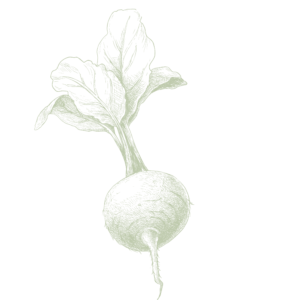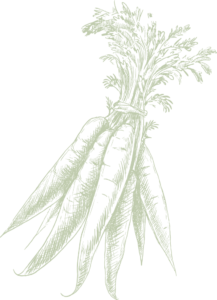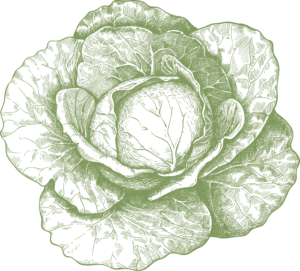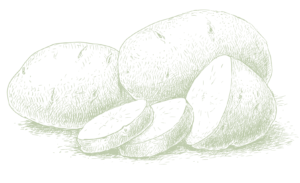One of the joys of living here is that we can get serious about gardening long before our friends farther north. This month is a perfect time to get your spring garden established. We chatted with Maxine Hunter,  horticulture agent at UF/IFAS Extension Marion County, to find out what we should be doing—and not doing—in the garden.
horticulture agent at UF/IFAS Extension Marion County, to find out what we should be doing—and not doing—in the garden.
The good news is you’re not too late if you have hopes of planting a spring vegetable garden, so long as you’re planting the right things. For example, if you want to grow tomatoes into the summer, choose a variety that is heat-tolerant.
Around March 1 is the target for getting plants in the ground. Because March can still have freezing nights, transplants are a safer bet than seeds—whether you’re working with seedlings you started indoors this winter or you’re purchasing plants.
Hunter recommends starting your own seedlings, simply because seed companies offer much greater selection and variety than buying established plants locally. (Plus, it’s fun to peruse seed catalogs as you plan your garden.)
 Marion County lies in USDA Planting Zone 9a, which runs horizontally across the state from Levy to Volusia counties.
Marion County lies in USDA Planting Zone 9a, which runs horizontally across the state from Levy to Volusia counties.
“Information on each individual seed packet tells you when to plant based on your zone. If the seed packet refers to Zone 9, that’s us,” says Hunter. “Some seed packets aren’t that specific, but will give you a region. If that’s the case, we are the Southern region.”
Hunter says one of the biggest mistakes people make is planting the wrong varieties. Often, people have moved to our area from other regions and try—unsuccessfully—to grow the same plants they did in another part of the country.
How About That Dirt?
Whether you’re planting in the ground or in containers, odds are your soil could use some help.
 If you’re planting a big garden, a soil pH test costs just $2 at the UF/IFAS Extension Marion County office. If you have very sandy soil or high clay content, you’ll need to improve the soil with organic matter before planting your veggies.
If you’re planting a big garden, a soil pH test costs just $2 at the UF/IFAS Extension Marion County office. If you have very sandy soil or high clay content, you’ll need to improve the soil with organic matter before planting your veggies.
“The higher the organic matter, the better the soil,” says Hunter.
Good choices for organic matter include mushroom compost, fish emulsion and manure that has been composted for at least 90 days to destroy any pathogens.
“Rabbit manure is good in gardens, but it’s high in nitrogen, so it needs to be composted or aged before you use it,” notes Hunter. “Fish emulsion works great, but it is smelly so some people don’t like it for this reason.”
Don’t use fresh manure because it could contain potentially harmful bacteria. (Buying already composted manure eliminates most of the worry about pathogens.)
Unless the ground is very compacted, you don’t really need to till it up. Place bagged garden soil (a better choice than top soil) and composted manure on top, then rake or hoe it into the soil before planting.
Too Much Of A Good Thing
Once your plants are in the ground or container, don’t make the common mistake of over-maintaining them with excessive watering and fertilization.
“It’s really ‘killing them with kindness’ and leads to more pests and disease problems,” explains Hunter.
 “Vegetable plants need a light application of fertilizer every three to four weeks, but look for a balanced fertilizer made specifically for vegetables, as many are too high in nitrogen,” she notes. “You don’t want over 10 percent nitrogen because too much nitrogen and the plants will be large and very green, but many won’t produce.
“Vegetable plants need a light application of fertilizer every three to four weeks, but look for a balanced fertilizer made specifically for vegetables, as many are too high in nitrogen,” she notes. “You don’t want over 10 percent nitrogen because too much nitrogen and the plants will be large and very green, but many won’t produce.
“For vegetables, it’s best to have a drip irrigation system set to go off at least once a day when transplants are getting established, and then cut back to every other day, unless it’s really hot.”
However you water your garden, be careful to water just the roots.
“Leaves don’t absorb water and when they stay wet, this can lead to fungal and bacterial problems,” Hunter explains.
Scout For Pests
Monitoring your plants regularly for pests may prevent the need to use chemicals. Look under the leaves for aphids, ants, caterpillars, etc., and remove by hand.
You can also apply an insecticidal soap or horticulture oil (such as neem oil) to ward off pests. Don’t use antibacterial soap or one containing degreaser as this can damage and burn plants. Dilute two tablespoons of liquid soap in one gallon of water and spray plants once every seven to 10 days as needed.
Hunter advises this method first rather than opting for pesticides, which kill beneficial insects, such as ladybugs, butterflies, bees and other pollinators.
If you have any questions about insects, planting or gardening advice, don’t hesitate to contact our local extension office. It’s a great, no-cost resource for identifying insects, poisonous plants, year-round gardening advice.
Garden Smarter With These Helpful Links
Florida Vegetable Gardening Guide
http://edis.ifas.ufl.edu/vh021
Gardening with Perennials in Florida
https://edis.ifas.ufl.edu/mg035
Natural enemies and biological controls
https://edis.ifas.ufl.edu/in120
Learn More › UF/IFAS Extension Marion County › 2232 NE Jacksonville Road, Ocala › (352) 671-8400 › marioncountyfl.org/departments-agencies/departments-a-n/extension-service/






